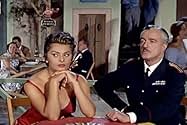IMDb-BEWERTUNG
6,5/10
2642
IHRE BEWERTUNG
Zurück in seiner Heimatstadt findet ein ehemaliger Marschall sein Haus von einer jungen Frau bewohnt, die als Fischfrau arbeitet.Zurück in seiner Heimatstadt findet ein ehemaliger Marschall sein Haus von einer jungen Frau bewohnt, die als Fischfrau arbeitet.Zurück in seiner Heimatstadt findet ein ehemaliger Marschall sein Haus von einer jungen Frau bewohnt, die als Fischfrau arbeitet.
- Auszeichnungen
- 3 wins total
Empfohlene Bewertungen
Vittorio de Sica is retiring from the Caribinieri, returning to Sorrento to become head of the Police Department. He comes equipped with an elderly governess, a brother who is a priest, and a great variety of uniforms, all with white gloves. What he lacks is a place to live. His family apartment has been occupied since the War by Sophia Loren, a widowed fishwife. She has a boyfriend with whom she fights a lot. This does not, of course, prevent her from coming on to de Sica, who easily loses his head over women -- it's Loren, who wouldn't? -- to keep the apartment and get her boyfriend a job with the police. The boyfriend objects to her methods. Meanwhile, de Sica is staying at the home of Lea Padovani, a highly religious and insanely repressed woman, as a favor to the priest.
I have the feeling that the movie's length of 110 minutes, although long for a comedy, is trimmed. Miss Padovani's sequences seem rather abrupt and Miss Loren, while startlingly beautiful, gives a performance that is rather harsh and monotonous; it's true she was only 20 when she made this, but she soon showed herself a capable farceur and actress of considerably greater range. Perhaps the producer and director simply lacked confidence in her abilities.
Despite these misgivings, this is a good comedy, mostly because of de Sica, who plays his well-written role of a mature and intelligent man who becomes a gibbering poet at the sight of a beautiful woman, with the beautiful freedom of a true clown.
I have the feeling that the movie's length of 110 minutes, although long for a comedy, is trimmed. Miss Padovani's sequences seem rather abrupt and Miss Loren, while startlingly beautiful, gives a performance that is rather harsh and monotonous; it's true she was only 20 when she made this, but she soon showed herself a capable farceur and actress of considerably greater range. Perhaps the producer and director simply lacked confidence in her abilities.
Despite these misgivings, this is a good comedy, mostly because of de Sica, who plays his well-written role of a mature and intelligent man who becomes a gibbering poet at the sight of a beautiful woman, with the beautiful freedom of a true clown.
The third part of the Maresciallo adventures trilogy is quite different from the previous two in being in colour and cinemascope, and replacing Gina Lollobrigida with Sophia Loren in a completely different environment. The Maresciallo returns to his native town Sorrento by the sea between Naples and Capri as a Comandante and is immediately exposed to new amorous adventures and perils, one being the crude fisherwoman Sophia Loren, who has occupied his home, and the other being a pious saint in the opposite direction (the lovely Lea Padovani). Sophia already has a boyfriend with a temper good enough to fight with anyone, so Sophia will not be easily convinced, although flattered by de Sica's undeniable gentlemanly advantages. The film is not on par with the two previous ones but the more enjoyable for its beauty and colours and wonderful environment. The dialog becomes second to the cinematography and rather banal intrigue, while the dialog is the backbone and core of the previous two. You lack Gina's tempestuous and very down to earth temperament, while Sophia Loren is more stylish but less convincing as a fisherwoman. Vittorio de Sica though is optimal as always.
I came to this film 65 years after it was made. Sophia Loren is a phenomenon, and if you watch "The Life Ahead" before you watch this, her extraordinary contribution to world cinema is even more apparent. This is Italy less than a decade after the end of World War II, yet the film is apolitical and concentrates on the lives of real people trying to make their way in a nation that suffered enormously from war but also from its own delusions and acquiescence to the "charms" of fascism.
Wusstest du schon
- WissenswertesFinal film of Clara Crispo.
- VerbindungenFeatured in Legendy mirovogo kino: Sophia Loren
Top-Auswahl
Melde dich zum Bewerten an und greife auf die Watchlist für personalisierte Empfehlungen zu.
- How long is Scandal in Sorrento?Powered by Alexa
Details
- Erscheinungsdatum
- Herkunftsländer
- Sprachen
- Auch bekannt als
- Liebe, Brot und tausend Küsse
- Drehorte
- Produktionsfirmen
- Weitere beteiligte Unternehmen bei IMDbPro anzeigen
- Laufzeit1 Stunde 50 Minuten
- Farbe
- Seitenverhältnis
- 2.55 : 1
Zu dieser Seite beitragen
Bearbeitung vorschlagen oder fehlenden Inhalt hinzufügen

Oberste Lücke
By what name was Liebe, Brot und 1000 Küsse (1955) officially released in India in English?
Antwort



























